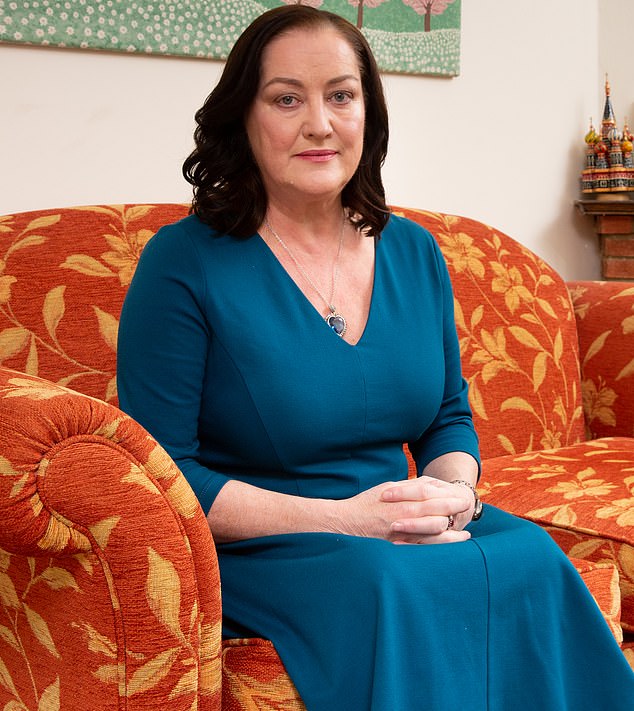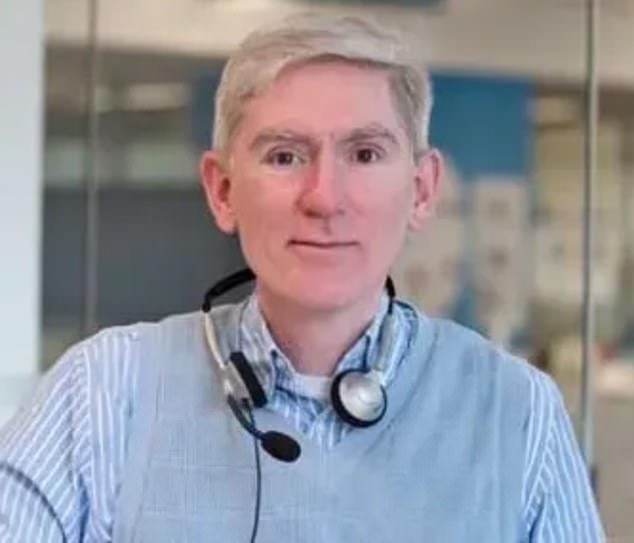The worst thing you can say to a cancer sufferer, and the other ways you’re annoying them without realising it – as revealed by a bereaved wife who’s seen the worst behaviour
When my friend Jenna was diagnosed with cancer, she knew she was going to lose her breast and her hair. What she didn’t expect was that she was also going to lose a good friend.
I told Emma [a mutual friend] “She told me about my diagnosis and seemed shocked, quickly finished her glass of white wine, said, ‘I can’t do this again,’ and ran out of the house,” says Jenna, 55.
‘Later that night she texted me saying, “I’m really sorry, but I’ve been through all this with my mom and aunt and I just can’t handle it.”
“I was very upset because I had held her hand for two years through a very messy, bitter divorce and now she wanted nothing to do with me. It was just awful. I felt like a leper.”
Cancer is a very divisive issue: when you are diagnosed, people are either thoughtful or thoughtless, kind or unkind, brave or cowardly. This is what happened when my husband Harry was diagnosed with terminal liver cancer in 2012 at the age of 71.
Mary Gold and her husband Harry, who was diagnosed with terminal liver cancer at the age of 71
The good friends were enormously helpful – I no longer want to have any contact with those who were not. One ‘friend’ slapped Harry on the shoulder and said: ‘Liver cancer, huh? Have a big gin and tonic! You’re not going to do any harm now, are you? Har har!’. When Harry was seriously ill, in his final days, another (former) friend said to me: ‘It’ll be a huge relief for you when this is all over, won’t it?’ Well, not really.
I was reminded of this recently when a friend was diagnosed with prostate cancer and I thought to myself, I have to do this right. I didn’t want to be one of those people who crossed the road when they saw him.
This is something that happened to Harry and me before in Canterbury, near where we lived. These people had seen us, we had seen them, but they still moved as far away as physically possible.
I realized I wanted to be kind, humane, and helpful. I didn’t want to be a cancer coward.
It’s a brutal fact that about one in two of us will get cancer, so it’s almost a given that it will affect someone close to us. To better deal with it, we need to think carefully about how we approach it.
According to Dr Anna Janssen, a clinical psychologist and spokesperson for the British Psychological Society, unusual behaviour around illness reflects the human instinct to avoid a threat to our survival. It is not exclusive to cancer, but applies to many conditions, including motor neurone disease and Parkinson’s.
As she explains, “We don’t like being confronted with something that reminds us of our own mortality. We find uncertainty challenging, especially in this day and age where we have so much technology, like AI, that gives us an illusion of certainty. It’s so much harder to deal with the idea that you’re like, ‘I don’t know what’s going to happen here.’

Mary says friends and family who listened and offered practical help when Harry had cancer were their biggest support
‘Being told that someone has cancer can also remind us of illness and loss in our own lives that we don’t want to think about. But we need to acknowledge that and separate our own experiences from what’s happening to our friend.
“We’re also afraid of saying or doing the wrong thing, so people hesitate or stay quiet, rather than give offense at an already difficult time. But remember that when a serious illness comes along, there’s already change and loss for that sick person, and they don’t want to lose the relationship they have with you.”
Dr. Janssen advises starting with simple gestures: a hug, a phone call, a text message or a card.
“Be the friend you’ve always been,” she says. “Listen and let the person who is sick tell you what they need.”
In our case, the biggest support was friends and family who listened and offered practical help when Harry had cancer and we were so grateful for whatever was offered. They brought delicious ready meals from M&S, took our then eight-year-old daughter on trips to the zoo and the seaside and helped with cleaning our house.
These acts of kindness made such a difference in Harry’s final days and ensured that our home was never a home of sadness. We did have a few good cries when our little girl was in bed, but acts of compassion ensured that we almost always had something to look forward to. My stepdaughters paid for a spa day and another friend gave us a voucher for Harry’s favorite Indian restaurant.
While it’s one thing to swerve to avoid talking to a cancer patient, which I also didn’t appreciate, were people who tilted their heads to one side and made funny faces – cartoon sympathy is very annoying, as is rubbing someone’s back in a circular motion. There were also people who rambled on about themselves, which was almost a standard mechanism, or who talked about family members who had cancer – and died from it. Don’t do that!
According to Martin Ledwick, chief nurse at Cancer Research UK, it is surprisingly common for people to be thoughtless when dealing with cancer.
Mr Ledwick, who runs the charity’s helpline, said it is often an instinctive reaction to cross the road to avoid cancer patients and their families, as people don’t know what to say or how to support someone with the disease.

According to Martin Ledwick, chief nurse at Cancer Research UK, it is alarmingly common to be thoughtless when dealing with cancer
“Most of us are nice people and we want to help everyone we love, but when someone tells us they’ve been diagnosed with cancer, we often go into reassurance mode and say, ‘I’m sure everything will be OK,’ when in reality we clearly don’t,” he says.
‘So that’s the one thing you shouldn’t do.
A better response is to just listen and say, “That’s really hard.”
“Don’t try to come up with a solution, because their life could easily take a different turn. Say optimistic things, but don’t assume they’ll heal, because that might not be the case. Just make them feel that someone cares about them.
“The person with cancer just wants to be heard and that’s what they need. The most important thing is to let them guide you: make realistic offers and don’t let your friend down. Offer rides to the hospital, help with grocery shopping and babysitting, and make sure you deliver what you’ve offered. Ask yourself what your skills are and what you can commit to.”
If you are considering offering practical things, such as a casserole, Mr Ledwick advises you to check with them first that this is okay. Never force an offer.
“There’s a lot to be said for just being there with that person, having a chat, being their friend, offering a movie night,” he says.
“Don’t beat yourself up if they reject you or feel useless. You offered. Someone going through chemotherapy feels and looks like crap and may want to hide. They may just want to be left alone for a while, but don’t forget to check in every now and then.”
The resentment I felt toward some people when my husband was ill was natural, says Mr. Lewdwick, but for my own good I really should have let it go. He says, “If someone says or does something wrong — like crossing the road — don’t carry that anger with you because it’s bad for you. Concentrate on the friends who are helpful.”
My dear husband passed away in 2014, two years after his diagnosis. But I like to think we made the most of that time – boat trips on the Royal Military Canal at Hythe, delicious meals in the Gurkha restaurants of Kent where we live, and very nice Sunday lunches with dear friends and family who weren’t cancer cowards and didn’t cross the road when we needed them most.
Cancerresearchuk.org
